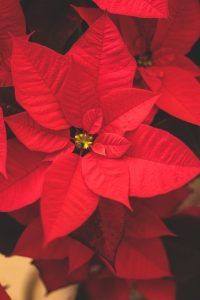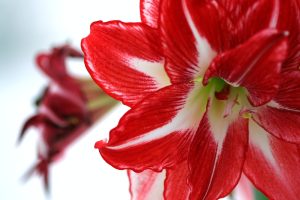Written by Samantha Walter-Cano, Edited by Olivia Zugay
With the holiday season in full swing, there are many ways to incorporate gardening into your holiday festivities. One of the most common ways is to use holiday plants as house/garden décor or even gift-giving. Surprisingly, Florida’s climate is suitable for many popular holiday plants. The important part is learning how to care for these plants and planting them ahead so they are ready for the next holiday season.
Poinsettia
One of the most recognized and common holiday plants is the Poinsettia. With its vibrant red bract leaves and striking green foliage, the Poinsettia is the most common holiday plant. Most commonly known as the Christmas plant, Poinsettias grow relatively well in Florida. Despite what many think, Poinsettias are not toxic or poisonous. Poinsettias are tropical plants and are native to Mexico.

How to Care
Poinsettias can be grown in pots or outdoors. As a potted indoor plant, it is important to avoid chilly drafts and keep them in a brightly lit area. These plants can tolerate full sun but must not frost and avoid freezing temperatures. Poinsettias also prefer moist soil and do not tolerate soggy soil. Only water when the soil is dry to the touch. As an outdoor plant, most of the same rules apply. For example, only water when needed; overwatering can kill a Poinsettia. Poinsettias should be planted when the risk of frost is gone and be located in a sunny spot (preferably free from artificial light). Unlike when potted, however, outside Poinsettia must be fertilized monthly. This ranges from March to October in south and central Florida, and in north Florida, May to September.
Flowering
Poinsettia plants are what are known as “short-day plants.” This means that they bloom only when exposed to the dark. They flower best during extended periods of darkness. That is why it is important to plant your Poinsettias away from artificial light. If the dark period is interrupted, the Poinsettia’s flowering may not occur. Pruning and pinching back the Poinsettias is important to contribute to a full, attractive plant during the holiday season. Poinsettias should be pruned after the last frost and can be cut back once a month during the summer.
Amaryllis
Another common holiday plant is the Amaryllis. Like the Poinsettias, Amaryllis grows well in Florida. In fact, Florida is the only state in which Amaryllis can be grown year-round. Amaryllis also displays a vibrant variety of flower colors, the most common being red for the holiday season. Amaryllis is usually grown in pots, but in Florida, they can be planted outdoors. Amaryllis are subtropical plants and are native to South Africa.

How to Care
Amaryllis can either be bought potted or as bulbs to plant in a pot of choice. When buying separate bulbs, it is important to remember that the bigger the bulb, the larger the flowers. The flower stalks can also be top-heavy, so it is recommended to use a container or pot that is heavy enough to balance the weight. The plant should be watered thoroughly, and after being placed in a bright and cool area, no additional watering should be done until the bulb sprouts. After sprouting, the pot should be placed in direct sunlight, and the soil should be kept moist. Once planted and watered, blooming should occur between 6 to 8 weeks. Another possibility in Florida is to transplant the bulbs into the ground. Bulbs can be transplanted between September and January in Florida. Outside a pot, Amaryllis should be planted in an area that provides partial sun, and the soil should be kept well drained. After the blooming of flowers, it is recommended to fertilize the Amaryllis, being that this promotes new spouts.
For information, check out these resources:
ENH1083/EP349: Poinsettias at a Glance (ufl.edu)
Poinsettia – University of Florida, Institute of Food and Agricultural Sciences (ufl.edu)
Cir-1243/EP060: Amaryllis (ufl.edu)
Amaryllis – University of Florida, Institute of Food and Agricultural Sciences (ufl.edu)
Source: UF/IFAS Pest Alert
Note: All images and contents are the property of UF/IFAS.



